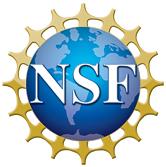 The National Science Foundation’s Directorates for Computer and Information Science and Engineering (CISE) and Social, Behavioral, and Economic Sciences (SBE) have issued a joint solicitation for interdisciplinary research and education projects that develop new knowledge at the interface of between computer science and economics & social sciences.
The National Science Foundation’s Directorates for Computer and Information Science and Engineering (CISE) and Social, Behavioral, and Economic Sciences (SBE) have issued a joint solicitation for interdisciplinary research and education projects that develop new knowledge at the interface of between computer science and economics & social sciences.
From the RFP:
An important research interaction has emerged at the interface of computing and economics and social sciences. The synergy between these fields creates a rich opportunity for studying questions that involve interconnected systems with economic and social aspects. This research interaction has already led to the identification of a number of underlying principles and research themes. These include network structures in economic interaction, theories of learning in the context of such networks, welfare properties of equilibria, the design of mechanisms with constraints, the complexity of computing equilibria, the robustness of equilibria, and the roles of information, reputation, and trust in economic and social interactions. These principles provide lines of attack on a set of important applications [including] the emergence of new kinds of on-line markets, the roles of economic issues in the architecture of the Internet, the design and analysis of markets in the developing world, and the roles of social and economic networks in innovation and knowledge creation.
The ubiquity of socio-technical networks has led to new … kinds of interactions and transactions… Key features of these new transactions include:
- parties who may not know or trust each other
- parties who may be represented by computational agents
- real-time adaptation and decision making by agents, possibly leading to chain reactions.
Designing decision mechanisms that can govern these increasingly important types of transactions in ways that meet criteria such as fairness, revenue maximization, and efficient resource use is a challenge that requires the expertise of both social and economic scientists and computer scientists.
Traditional concerns of computer scientists such as internet traffic, email, the allocation of computing resources to competing processes, and many more may be managed using economic and social choice mechanisms to achieve better utilization and reduction of the nuisance and harm caused by such adversaries as intruders and spammers. Good incentive mechanisms are also needed to mediate the interactions among infrastructure providers, service providers, and clients for computing and communication infrastructure and services. Mechanisms are also important in driving multi-agent software systems towards socially desirable goals. These questions may require a new understanding of simultaneous collaboration and competition among self-interested agents.
Conversely, an algorithmic/computational perspective has the potential to change the types of questions considered by social and economic scientists. For example, Nash and other equilibria lie at the hearts of theories about the behavior of economic agents. Computational concepts can help characterize the range and robustness of possible equilibria and markets for which the computation of equilibria is intractable. Theories of strategic learning by selfish agents, studied both in economics and computer science, can shed light on the dynamics of how agents arrive at equilibria. Theories of the spread of information or gossip in networks can help explain and contain (or propel) the chain reactions that can arise.
Of particular note per the solicitation:
- Algorithmic approaches and analyses for social science questions involving resource provision and allocation in noisy, distributed and/or unsynchronized environments, collective decision making, and related topics; and
- Mechanisms that use ideas from social and economic science to improve the performance of computing systems and other systems of multiple, self-interested agents.
Full proposals — in the small and large categories — are due between November 21 and December 6, 2011. NSF expects to award $6.5 million to 10 to 20 projects.
For complete details, see the official solicitation. And for past awards through this program, click here.
(Contributed by Erwin Gianchandani, CCC Director)










Trackbacks /
Pingbacks